Kangaroo Justice in South Africa
Dan Roodt, American Renaissance, September 11, 2020
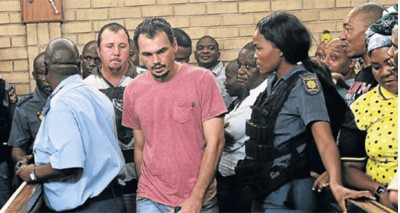
South Africa used to have some of the finest courts in the world, but after 26 years of black rule, they are typically African. According to insiders, even judges may be bought. Willem Oosthuizen and Theo Jackson, two white farmers who played a prank on a suspected black thief, got a taste of African-style justice and almost spent 14 years in jail.
Partly thanks to the Covid-19 virus, both were recently released on parole, having spent 3-1/2 years inside and fighting one legal battle after another, right up to South Africa’s Supreme Court of Appeal. Their stay in prison, as well as their legal battle, ruined them and their families; their wives and children lived on donations from Afrikaner organizations.
The so-called “coffin case” started in 2016, when Mr. Oosthuizen and Mr. Jackson, both farm managers on the land of a wealthy farmer, a Mr. De Beer, caught a black trespasser, Victor Mlotshwa, with some cables in his possession. Theft of copper cables for electric transmission is a huge problem in South Africa and has already caused most of the South African rail service to stop running. Black criminals hack away the cables and sell the copper to unscrupulous scrap dealers. Most of this “scrap copper” is then exported to China and India.
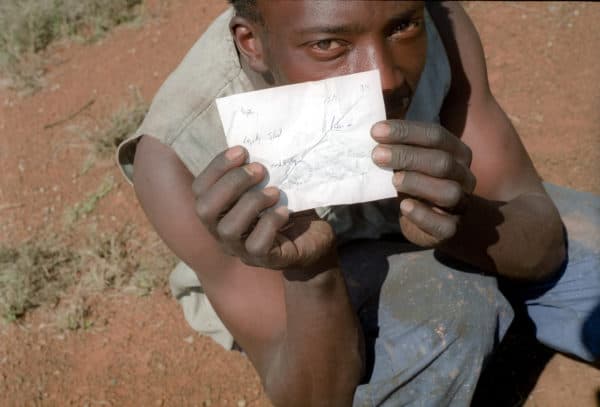
July 19, 2020, Pietermaritzburg, KwaZulu Natal, South Africa: A waste picker shows his receipt for the sale of precious metals to a city scrap dealer. (Credit Image: © John Robinson / ZUMA Wire)
A second black man, Delton Sithole, claimed separately that he had been assaulted and insulted by the two white men on August 17, 2016, and testified in court that they men had repeatedly called him “kaffir,” the South African equivalent of “nigger.”
When the two farm managers told Mr. Mlotshwa they would take him to the police station, together with his bag of cables, he became belligerent. “He threatened to kill our wives and children,” Mr. Oosthuizen testified at trial. “He said he would burn our mealie crops every year. I was angry and scared.”
Playing on African superstitions about death, the two men decided to put him in a coffin that had been stored in a nearby barn.
For three months after the incident, nothing happened. There was no retaliation or further trespass. But the two white farm managers had made a cellphone video of Mr. Mlotshwa begging for mercy inside the coffin. They belonged to a WhatsApp group for farm security, which is necessary in a country where farm attacks and murders are common, and somehow a 20-second snippet was shared on the group. From there it leaked to the black tabloid The Sun, where it created anti-white outrage.
Only the feet of the white men were visible, so the police had no idea whom to look for, or even in what part of the country. But Mr. De Beer, the boss of the men who played the prank, found out about the video. His business depended on government contracts, so he decided to ask his lawyer what to do. The lawyer’s advice was that his employees should “do the honest thing” and hand themselves over to the police. It was only a prank, so they might get off with a fine.
Naively, Mr. Oosthuizen and Mr. Jackson accepted this advice. They also had a longer version of the video which they handed in as evidence that they had not harmed Mr. Mlotshwa. The longer video was also leaked to the media, and many large news websites posted it online, including the SABC.
In the video, Mr. Mlotshwa can be seen in the coffin while the men speak to him in Afrikaans with some sentences in Zulu, South Africa’s main black language which many farmers speak. He begs for mercy as they ask him why he was was on their farm stealing cables.
The initial charge against them was what is called “common assault” in South African law. But as the din of racism accusations grew, the police changed it to “assault with the intent to do grievous bodily harm,” a much more serious charge. But even this did not satisfy the mainstream media, as well as South Africa’s “Black Twitter,” where some blacks called for the death penalty, despite the fact that South Africa’s liberal Constitutional Court forbids it. So their charge sheet grew: illegal possession of a firearm and attempted murder.
For nine years, both of the accused had paid monthly dues to the conservative “civil rights organisation” called Afriforum, whose legal team takes on cases involving discrimination against whites, as well as corruption among state officials. So wild was the media frenzy, and so loud were the cries of “racism” that even Afriforum refused to defend its own members. They were without legal representation until another lawyer, Marius Coertze, offered his help.
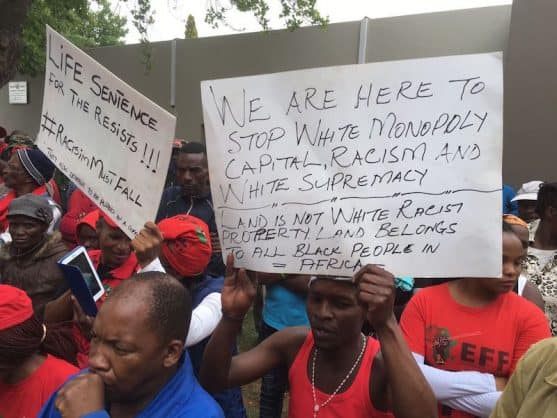
“Life sentence for the racists.” Members of the radical black party, the EFF, outside the Magristrate’s Court in Middelburg where the coffin trial was held.
According to Mr. Coertze, the death threats and physical assaults against him and his woman assistant in court were so bad, they sometimes had to hide in the holding cells below the court. The police told them that was the only place where they “could guarantee their safety.” Throughout the proceedings, black police stood by as members of the black crowd hit or manhandled whites, including relatives of the accused and their lawyers.
The British Mirror reported on the eve of their first sentencing that “dozens of extra armed police officers were drafted in to keep law and order both inside and outside the court for fear of violence breaking out if the sentence had not been a long prison term for them both.”
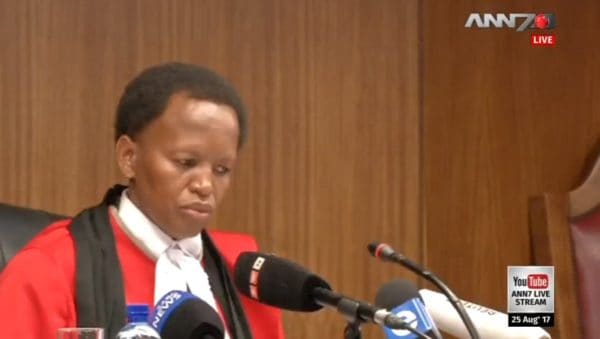
Judge Segopotje Sheila Mphahlele delivering her judgement at the Middelburg
Magistrate’s Court
The mob was not disappointed. According to Marius Coertze, the defense attorney, this was Judge Segopotje Sheila Mphahlele’s first criminal trial. Openly siding with the prosecutors, she sentenced Theo Jackson to 19 years imprisonment, of which five were suspended, meaning an effective term of 14 years. Willem Oosthuizen got 16 years, again with five suspended, giving him 11 years. Judge Mphahlele also barred the two white men from appealing her judgement and their sentences.
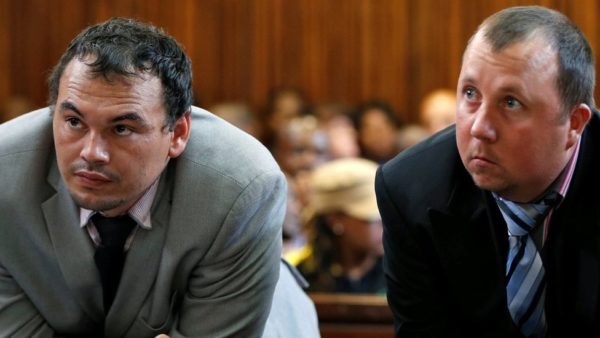
Theo Jackson and Willem Oosthuizen listening to their heavy sentences for having
put Mlotshwa in a coffin
Government spokesman Phumla Williams welcomed the sentences in November 2017, saying they “restored hope in the country’s criminal justice system.” The Minister of Sports, Arts and Culture, Nathi Mthethwa, also tweeted his satisfaction:
We welcome the sentences handed down on the #CoffinAssault culprits who were respectively sentenced to 11 & 14 years direct imprisonment.
— Min. Nathi Mthethwa (@NathiMthethwaSA) October 27, 2017
However, John Kane-Berman, a liberal commentator from the think tank South African Institute of Race Relations, responded in an article called “Coffin case: Excessive sentences do not serve justice.” He compared their sentences to those in other cases, such as the trial of celebrity athlete Oscar Pistorius, who received only a six-year sentence for murdering his girlfriend: “The punishments handed down to the two men have been widely welcomed. Given the nature of the crime and its racial component, this was to be expected. But whether their punishments actually fit the crime is a different question.”
All the political parties had delegations of protesters at the court, including the party supported by most whites, the liberal Democratic Alliance. The media had already found the defendants guilty of racism and “a heinous crime.” Official “conservatism” took the same line. Flip Buys, the head of the mainstream conservative movement Solidarity, also distanced himself from the two men, saying that he hoped they would “face the full might of the law.” Mr. Buys thought their behavior “reinforced the ANC’s stereotyping of Afrikaners and white people as cruel racists.”
For her role in “stamping out racism,” the judge was soon promoted, becoming deputy judge president of Mpumalanga Province.
The men’s wives were devastated by the lengthy prison terms. News24 interviewed them, still under the shock of hearing that their young children would lose their fathers for more than a decade. Mr. Jackson’s wife, Rianie, recognized that the media had portrayed the two men in an extremely bad light, which then allowed the judge to impose extreme sentences.
For the next two years, with even mainstream conservative and Afrikaner organizations such as Solidarity and Afriforum giving them the cold shoulder, Mr. Jackson and Mr. Oosthuizen fought the black-dominated legal system for an opportunity to appeal. They ultimately had to petition the Supreme Court of Appeal, which finally granted them leave to appeal in February 2018. In December 2019, the Supreme Court of Appeal delivered its judgement, reducing their sentences to five years each.
Ironically, the men were convicted on the basis of their own cellphone video. The Supreme Court of Appeal found that the State’s two witnesses, Mr. Mlotshwa and Mr. Sithole, were unreliable and that their statements were contradictory.
The Appeal Court was highly critical of the trial court judge, stating:
Given the many improbabilities in the complainants’ account, coupled with contradictions in their own evidence and the objective facts, the trial court erred in accepting the evidence of Sithole as proof of the commission of the assault against him. The trial court’s evaluation of the evidence and its approach to credibility findings of the State witnesses was incorrect in light of the material contradictions and improbabilities. The court a quo should have determined the matter on the version of the appellants. The video recordings and photographs corroborate their version.
Shortly after they were released on parole in March, the ANC regime returned them to prison on the grounds that Mr. Sithole (whose evidence of assault was rejected by the Supreme Court of Appeal) was a supposed victim “who had not agreed to their release.” Using the “feelings” of black victims toward white perpetrators is a favorite ploy of the ANC; the most famous case is that of the widow of the assassinated communist terrorist, Chris Hani, who refuses to let his shooter, Polish-South African Janusz Waluś, out on parole despite his having been recommended for release several times by the Correctional Department.
Mr. Oosthuizen and Mr. Jackson also qualified for the Covid-19 amnesty announced by President Cyril Ramaphosa because they were not violent criminals and had caused Mr. Mlotshwa no bodily harm. They were also first-time offenders. Again, legal wrangling followed, but they were finally released on August 15 to return to their families.
Double standards are becoming more and more blatant. Two young white women, Celine de Ridder (21) and Micayla Victor (19), died after being hit by a black minibus taxi driver who went through a traffic light and fled the scene.
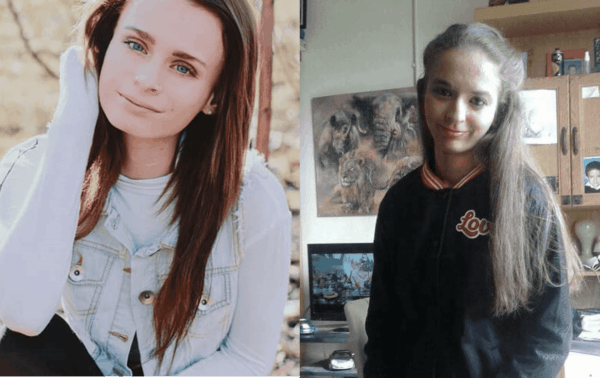
Micayla Victor and Celine de Ridder
The driver got off with a R12,000 fine, half of which was suspended, so he had to pay R6,000 (about $360, or $180 for each white girl’s life). His license was suspended for a year. Only one local radio station reported the case: “Taxi driver who killed two PE women pays fine and walks free.” One Afrikaans website carried the story too, and I made a short YouTube video about it, also in Afrikaans. There was no major media attention.
In the meantime, the coffin man, Victor Mlotshwa, has filed a civil suit against Mr. Oosthuizen and Mr. Jackson, claiming R400,000 ($24,000) for “racism” and impairment to his dignity. So, coming out of prison, without jobs and with their families destitute, the two whites will face more legal problems. Usually in a case like this, the lawyers’ fees of a black “victim” are picked up by anti-white NGOs funded by US foundations, banks, multinational corporations, European embassies in South Africa, and the European Union. There is no one to support whites.















